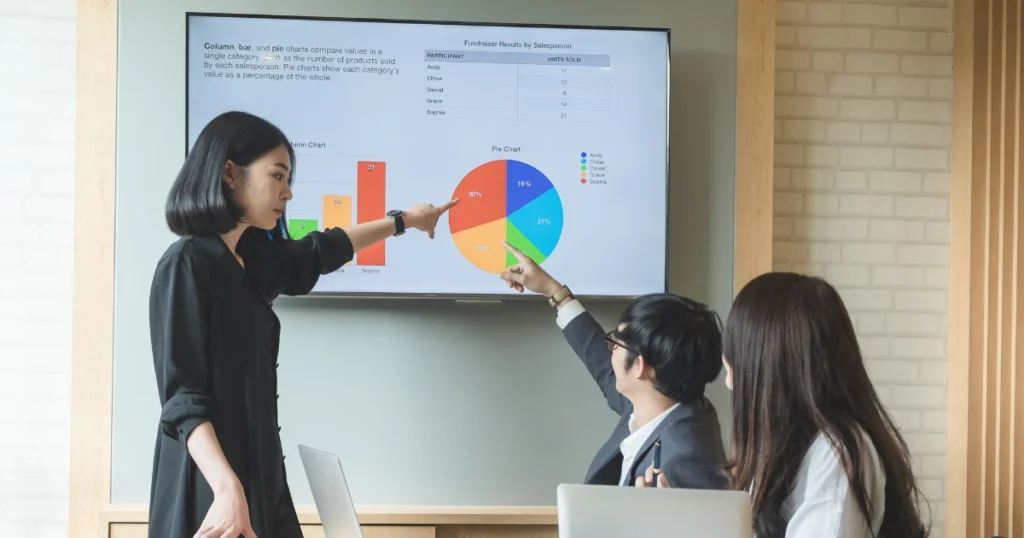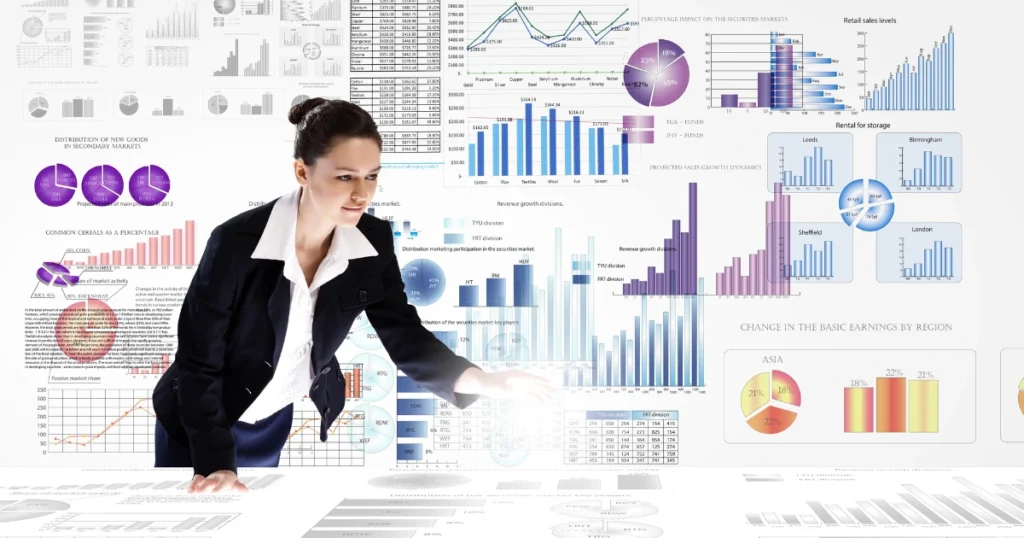Data Analytics in Business: “Data will talk to you if you’re willing to listen.” – Jim Bergeson
In the Indian business environment, where competition is fierce and customer expectations are constantly changing, Data Analytics in Business isn’t just a buzzword – it’s a necessity. Whether you’re running a startup in Bengaluru, a manufacturing unit in Pune, or an e-commerce store in Delhi, the way you collect, process, and interpret data could decide your future growth! Yes, it’s that important.
What is Data Analytics in Business?
At its core, Data Analytics in Business is the process of examining datasets to find trends, patterns, and insights that can improve decision-making. Think of it as the art of turning raw numbers into a clear story that helps you make better business calls.
From forecasting product demand to optimising delivery routes, businesses across India are using data analytics to improve efficiency and increase profits. According to a NASSCOM report, companies adopting analytics have seen up to 15–20% higher operational efficiency within the first year.

Why is Data Analytics in Business so Important?
Let’s face it – in business, gut feeling alone won’t cut it anymore. Data-backed decisions give you:
- Faster problem-solving: Identify operational bottlenecks in days, not months.
- Market understanding: Spot changing consumer behaviour before your competitors.
- Cost optimisation: Save resources by predicting future demand more accurately.
- Risk reduction: Analyse historical data to prevent costly mistakes.
McKinsey notes that data-driven companies are 23 times more likely to acquire customers. That’s no small number in a market as competitive as India.
Types of Data in Business Analytics
When we talk about the types of data in business analytics, we’re essentially talking about what kind of information you’re working with:
- Structured Data: Organised, easy-to-read data in tables (e.g., sales reports, inventory logs).
- Unstructured Data: Free-form data like customer reviews, videos, and emails.
- Semi-Structured Data: Partly organised, such as XML files or JSON datasets.
- Real-Time Data: Information generated instantly, like live customer tracking in food delivery apps.
The choice of data type often depends on the nature of your business and the tools you use.
Data Analytics in Business Decision Making
Every good decision needs a foundation. Data Analytics in Business decision making gives that foundation by transforming raw numbers into meaningful insight.
For example:
- Retail: Predict which products will sell more during Diwali based on last year’s sales data.
- Finance: Analyse credit risk before approving loans.
- Manufacturing: Forecast equipment maintenance to avoid costly downtime.
A study by PwC found that companies making data-driven decisions were 5% more productive and 6% more profitable than their peers.

Data Visualisation in Business Analytics
Numbers in a spreadsheet may not speak to everyone – that’s where data visualisation in business analytics comes in. Visuals help turn complex datasets into charts, graphs, and dashboards that make sense instantly.
Imagine showing your quarterly sales data as a colour-coded heatmap rather than a 20-page Excel file. Which one do you think your CEO will appreciate more?
Popular tools in India for data visualisation include Tableau, Power BI, and Google Data Studio.
Business Intelligence and Data Analytics
While both business intelligence and data analytics work towards smarter decisions, there’s a difference:
- Business Intelligence (BI) is about looking back – analysing historical data to understand what happened.
- Data Analytics is forward-looking – predicting what will happen and why.
Together, they give businesses a complete picture for planning future strategies.
Impact of Data Analytics on Business
The impact of data analytics on business is visible across industries:
- E-commerce giants like Flipkart use AI-driven analytics to recommend products to customers in real-time.
- Banking leaders like HDFC Bank use analytics to detect fraud before it happens.
- Logistics companies like Delhivery track real-time delivery data to reduce delays.
In each case, analytics has led to higher customer satisfaction, increased profits, and improved efficiency.
Examples of Business Analytics that you may already Know!
Here are some examples of business analytics in the Indian context:
- Swiggy: Uses predictive analytics to estimate delivery times accurately.
- Ola Cabs: Optimises driver allocation using real-time location data.
- BigBasket: Analyses buying patterns to restock inventory in advance.
These companies didn’t just collect data – they analysed it, acted on it, and reaped the rewards.
Career in Data Analytics: Is it Worth It?
If you’re wondering whether a career in data analytics is a good choice, the answer is a resounding yes. LinkedIn ranks Data Analyst among the top emerging jobs in India, with demand growing each year.
Common roles include:
- Data Analyst: Focuses on interpreting datasets to find insights.
- Business Analyst: Works on improving processes based on data findings.
Average salaries for entry-level data analysts in India range from ₹4–6 LPA, with experienced professionals earning ₹12–20 LPA or more.

Data Analytics Training & Courses
To step into this field, data analytics training is essential. That’s where our Business Analytics with Data Analytics course comes in – a combined program designed to give you the best of both worlds.
You’ll learn how to interpret data effectively and also how to apply those insights in real business scenarios. The course includes hands-on projects, real-world case studies relevant to the Indian market, and practical exposure to tools like Excel, SQL, Tableau, and Power BI.
Alongside this, we also offer individual Data Analytics and Business Analytics courses for those who want to specialise in one area.
We recommend pairing our training with Zenoffi E-Learning Labb’s courses for an even stronger skill set:
- Data Science: Master predictive analytics and AI-powered solutions.
- Data Analytics and Business Analytics: Learn how to transform raw data into actionable strategies.
- Digital Marketing: Understand how analytics can amplify marketing impact.
By enrolling in these programs, you’ll be equipping yourself with skills that are in high demand across industries in India.
Future Trends in Data Analytics in Business
The next few years will see exciting changes:
- Predictive Analytics – Anticipating customer needs before they even express them.
- AI & Machine Learning Integration – Smarter, faster analytics processing.
- IoT Data Streams – Using sensor-generated data for industries like agriculture and manufacturing.
Indian companies are already adopting these trends, making analytics an even more valuable skill to have.
On A Final Note…
“Without data, you’re just another person with an opinion.” – W. Edwards Deming
Whether you’re aiming to make smarter business decisions, launch a new career, or upskill your team, now is the perfect time to invest in Data Analytics in Business. The opportunities are growing, the tools are more accessible than ever, and the Indian market is ripe for data-driven success.
If you’re ready to start, explore our Data Analytics and Business Analytics courses or enrol in Zenoffi E-Learning Labb’s Data Science, Data Analytics, and Digital Marketing programs. Your future in analytics could begin today!
FAQs
Q1: Is Data Analytics in Business only for large companies?
No, small businesses can benefit too – even a local shop can use analytics to track sales patterns.
Q2: What’s the difference between a Data Analyst and a Business Analyst?
A Data Analyst focuses on datasets, while a Business Analyst uses data to recommend process improvements.
Q3: How long does it take to learn data analytics?
With focused data analytics training, you can gain job-ready skills in 6–9 months.





